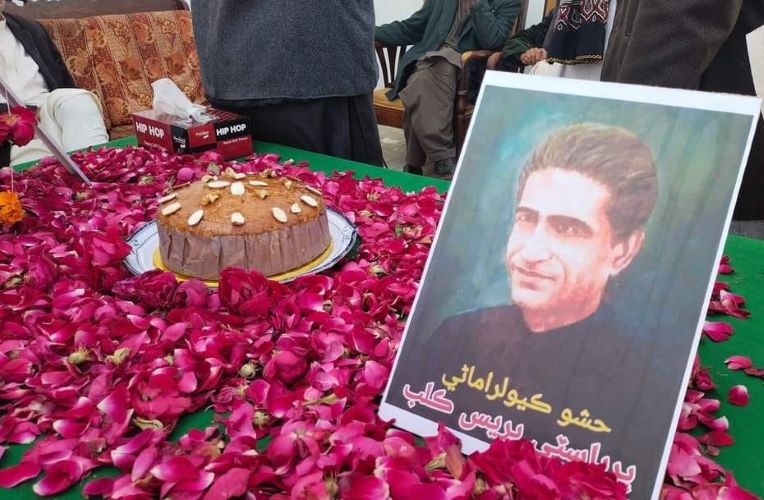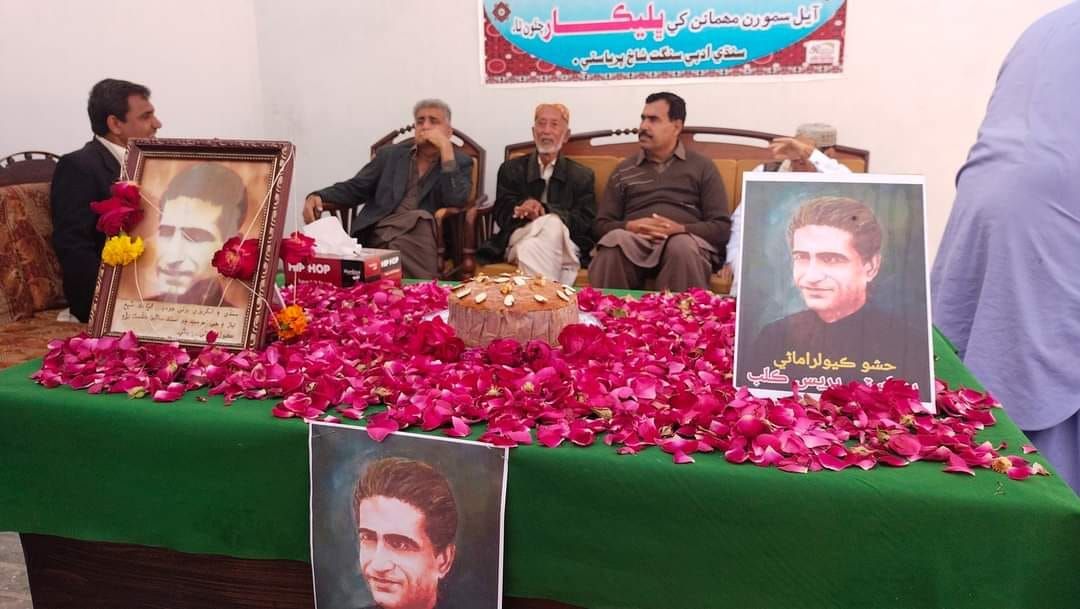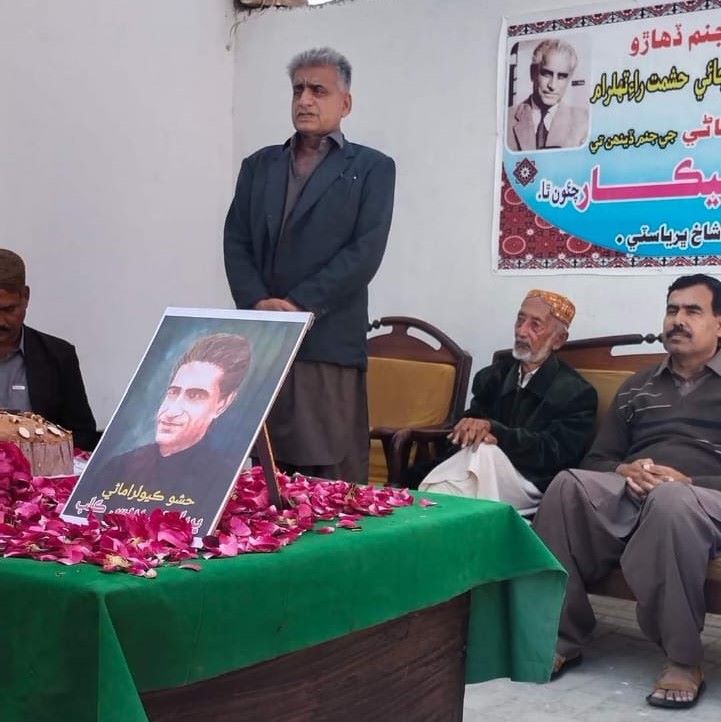
Writers, journalists and social activists from Hashu’s home district attended the ceremony organized by Sindhi Adabi Sangat
Sindh Courier Correspondent
Bhiria, Sindh
The local chapter of Sindhi Adabi Sangat, a literary body, organized a simple ceremony on Dec 20, 2023 to commemorate the 109th birthday of Hashu Kewalramani, a freedom fighter, writer and political activist, who was born in Bhiria.
The birthday ceremony, held at Bhiria Press Club, was presided over by Syed Fateh Ali Shah alias Faiz Bhiriae, and attended by Ali Sher Keeriyo from Tharushah town, Abbullah Shad Jalbani from nearby village Darya Khan Jalbani, Naseer Mallah, journalist Rana Sher Muhammad, Mazhar Khaskheli, Zahid Rajpar, Zahid Qaimkhani, Prof. Asghar Bhatti Bhiriae, Abdul Majeed Keeriyo, Meer Muhammad Sahito and other writers and journalists of Naushehro Feroze district.
The speakers on this occasion paid rich tribute to Hashu Kewalramani and said he was the mentor Saeen G. M. Syed and Shaikh Ayaz. Earlier, the participants cut the cake to celebrate the birthday of a great Sindh-lover.
 About Hashu Kewalramani
About Hashu Kewalramani
Hashmat Kewalramani, who loved to be called as Hashu Kewalramani (Also spelled as Hashoo), was a political activist, freedom fighter and writer of Sindh who was forcibly exiled from Pakistan in 1949.
As a writer, he authored two books ‘Pakistan X-rayed’, a compilation of his articles, and ‘Sindhi Short Stories’, translated in English. He wrote articles for Economic and Political Weekly.
Hashu Kewalramani was born in Bhiria City, a town of Naushahro Feroze District (Formerly part of Nawabshah District) on December 20, 1914. His father, Tehilram, served as a Resident Magistrate. After his father’s demise when he was eight, his mother took over his upbringing and education.
He received primary education at Kauromal Chandanmal Academy School of his hometown and secondary education at N J V High School Karachi. Hashu’s educational journey took him from Bhiria to Karachi and then to Ceylon (modern-day Sri Lanka), and eventually to England, where he was exposed to socialism. While in London, he was a class fellow of Indira Gandhi and was actively involved in the independence movement. His family wanted him to pass the ICS examination and became Deputy Collector, but he left ICS studies.
Among his companions in Sindh were Shaikh Ayaz, Sobho Gianchandani, Ibrahim Joyo, and GM Syed. His political involvement grew while in England, culminating in his active participation in the Indian student community and the labor movements. He returned from England without a degree to engage in politics.
Also read: The Black Day when Hashu Kewalramani was forced to leave Sindh
Returning to Sindh in 1939, he became involved in the Karachi Labor and Student Movements. Despite confrontations with authorities leading to his imprisonment, Hashu Kewalramani founded the Sindh Students Federation in 1942, encouraging socialist and nationalist ideologies among young people.
 Following the 1947 partition of India, Hashu Kewalramani advocated for Sindhi rights and due to this, he was placed under house arrest in Karachi. During this period, he translated GM Syed’s book ‘My Struggle for a New Sindh’ into English. His activities were deemed threatening by the new Pakistani government, resulting in his forced departure from the country in 1949.
Following the 1947 partition of India, Hashu Kewalramani advocated for Sindhi rights and due to this, he was placed under house arrest in Karachi. During this period, he translated GM Syed’s book ‘My Struggle for a New Sindh’ into English. His activities were deemed threatening by the new Pakistani government, resulting in his forced departure from the country in 1949.
Despite being presented before Masood Khadarpoosh, then Commissioner of Karachi, Hashu Kewalramani was unwilling to leave Pakistan for India.
Relocated to India, he turned to journalism and worked towards the recognition of the Sindhi language and culture. He was a significant figure in the movement to include the Sindhi language in the Indian Constitution and advocated for the revival of the Sindhi script. Hashu Kewalramani maintained communication with key figures in Sindh and composed numerous English columns regarding various sociopolitical issues. He also translated several Sindhi stories into English, further contributing to Sindhi literature. Even after several years of exile in India, he considered himself a refugee.
Hashu Kewalramani married Sarla Ahuja, with whom he had a son named Gul who later gained prominence in the art world.
_________________